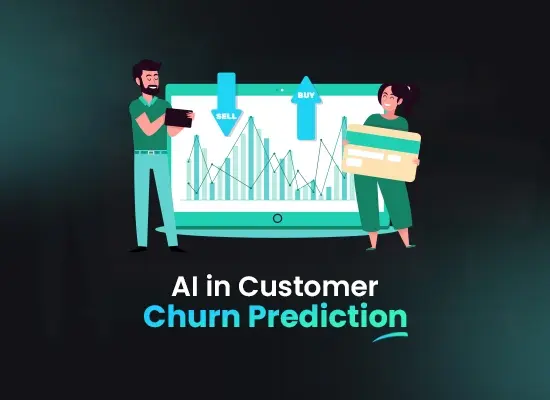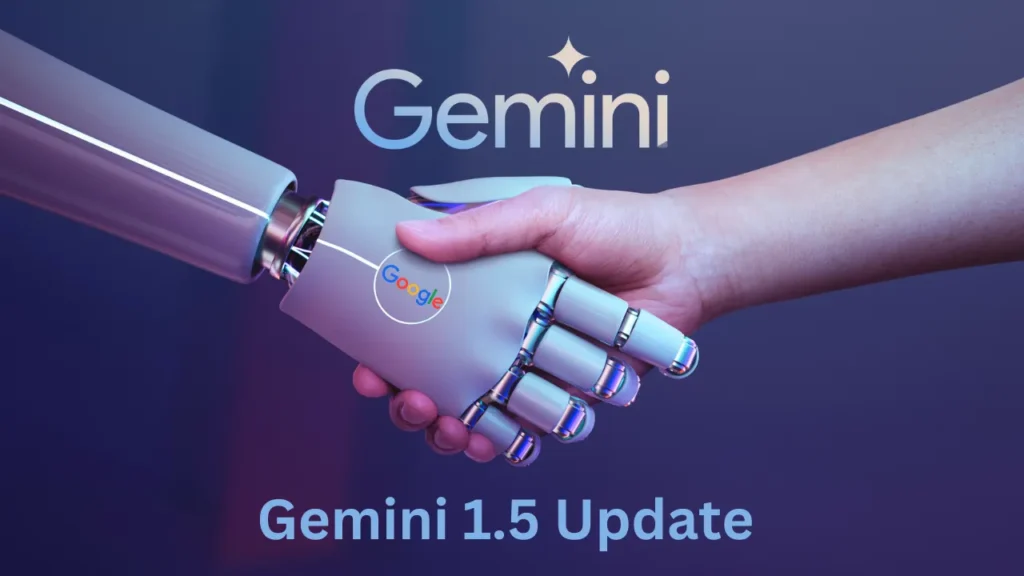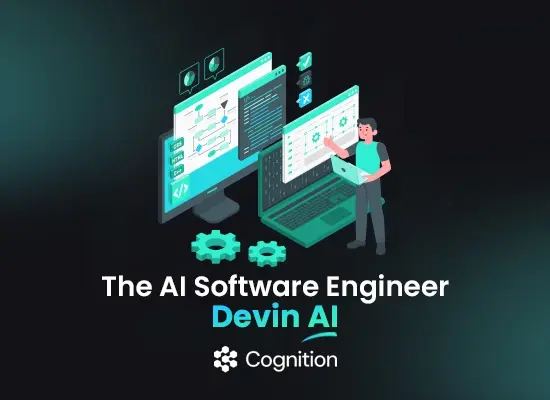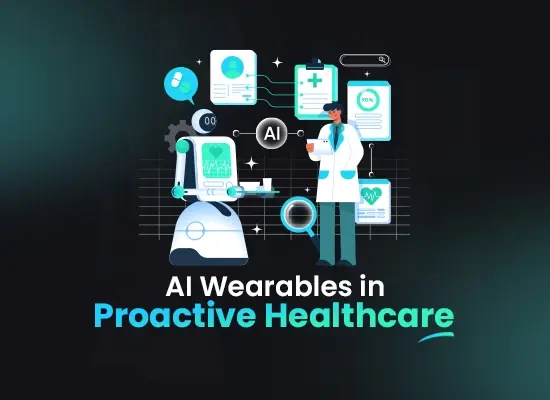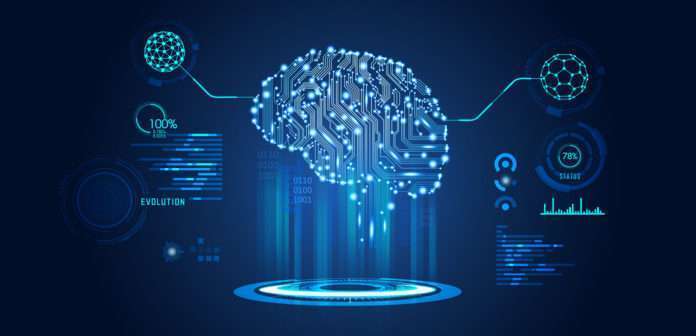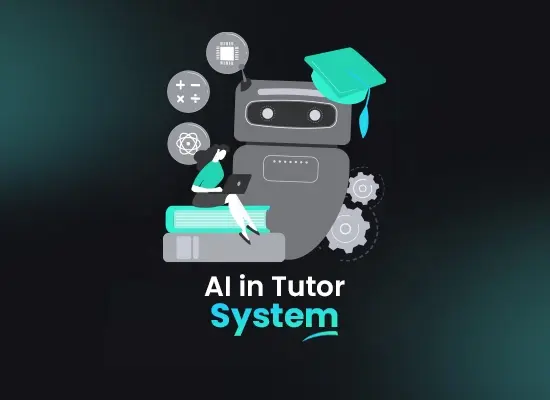Med-Gemini Update – DeepMind has Just Released an AI to Aid Gemini
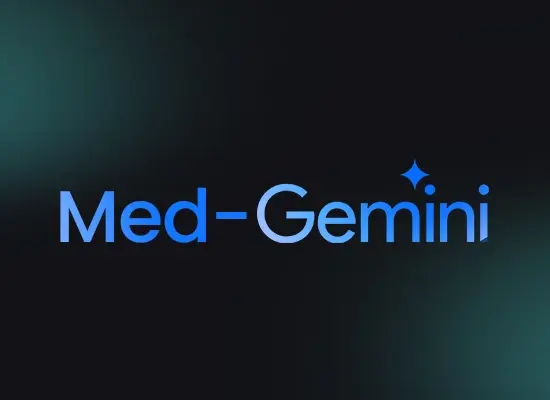
In a major leap forward for healthcare, Google has unveiled Med-Gemini, a groundbreaking family of AI models specifically designed for the medical field. This innovative technology promises to revolutionise diagnostics, treatment, and overall patient care by harnessing the power of artificial intelligence.
What is Med-Gemini?
Med-Gemini is a cutting-edge development from DeepMind, Google’s AI research lab. It builds upon the foundation of the Gemini family of models, known for their prowess in language processing, multimodal understanding, and long-context reasoning. But Med Gemini takes things a step further by specialising in the medical field.
This specialisation involves several key features. Med Gemini is trained on vast amounts of medical data systems, encompassing text reports, medical images, and even clinical trial data. This allows it to develop a deep understanding of medical concepts, diseases, and treatment options. Furthermore, After the update of Gemini AI, Med Gemini incorporates “clinical reasoning” capabilities. This means it can analyse complex medical situations, weigh different possibilities, and arrive at potential diagnosis or treatment plans, much like a human doctor would.
One of the most significant advancements of Med Gemini is its ability to perform real-time web searches during consultations. This “uncertainty-guided search” allows Med Gemini to identify situations where its internal knowledge might be limited. It can then proactively seek out the latest medical information to refine its response and ensure the most up-to-date insights are considered. This continuous learning loop through real-time searches makes Med Gemini a truly dynamic system.
Overall, Med Gemini represents a significant leap in the field of medical AI. By combining deep medical knowledge with advanced reasoning and real-time information retrieval, Med Gemini has the potential to revolutionise healthcare delivery. This powerful tool can assist doctors in various ways, from analysing complex patient data to suggesting treatment options. While Med-Gemini is not intended to replace doctors, it can function as a valuable companion, enhancing their capabilities and ultimately improving patient outcomes. As Med-Gemini continues to develop and learn, we can expect even more exciting advancements in the years to come.
Seamless Collaboration | Cost-Efficient Solutions | Faster Time-to-Market

What is the Role of AI in Clinical Reasoning?
Clinical reasoning, the process by which doctors weigh evidence and arrive at diagnosis and treatment plans, is a complex dance between knowledge, experience, and intuition. But in an age of ever-growing medical data, artificial intelligence (AI) is emerging as a powerful partner in this critical dance. Here at med-Gemini, we’re constantly keeping an eye on this evolving field, and our “Gemini 1.5” with Gemini update feature will highlight some of the most exciting advancements.
AI in clinical reasoning isn’t about replacing doctors. Instead, it’s about providing them with intelligent tools to augment their expertise. DeepMind, a world leader in AI research, is a prime example. Their work on analysing medical imagery has shown remarkable promise in areas like cancer detection. By sifting through vast datasets of medical scans, AI can identify subtle patterns that might escape even the most trained human eye.
This data-driven approach extends beyond just images. AI systems can analyse a patient’s entire medical history, incorporating lab results, medications, and past diagnoses. By drawing connections across these vast medical data systems, AI can help clinicians identify potential health risks, drug interactions, and even suggest personalised treatment options.
However, it’s important to remember that AI and machine learning development is still under progress in the realm of clinical reasoning. While AI excels at pattern recognition and data analysis, it currently lacks the human ability to understand the nuances of a patient’s medical history and emotional state. The future of AI in clinical reasoning lies in its ability to complement, not replace, human judgement. By providing doctors with powerful data analysis tools and highlighting potential risks, AI can empower them to make more informed decisions and ultimately deliver better patient care. As Med Gemini continues to provide updates on this field, we can expect to see AI playing an increasingly important role in shaping the future of clinical reasoning.
What are the Benefits of Med-Gemini?
Med-Gemini, a groundbreaking innovation from DeepMind, is rapidly transforming the healthcare landscape. This powerful AI system, constantly evolving through “Gemini updates,” empowers medical professionals with a vast array of benefits. By seamlessly integrating with existing medical data systems, Med Gemini unlocks a new era of clinical reasoning, promising to significantly improve patient care. Here’s a glimpse into the top 10 benefits Med-Gemini offers:
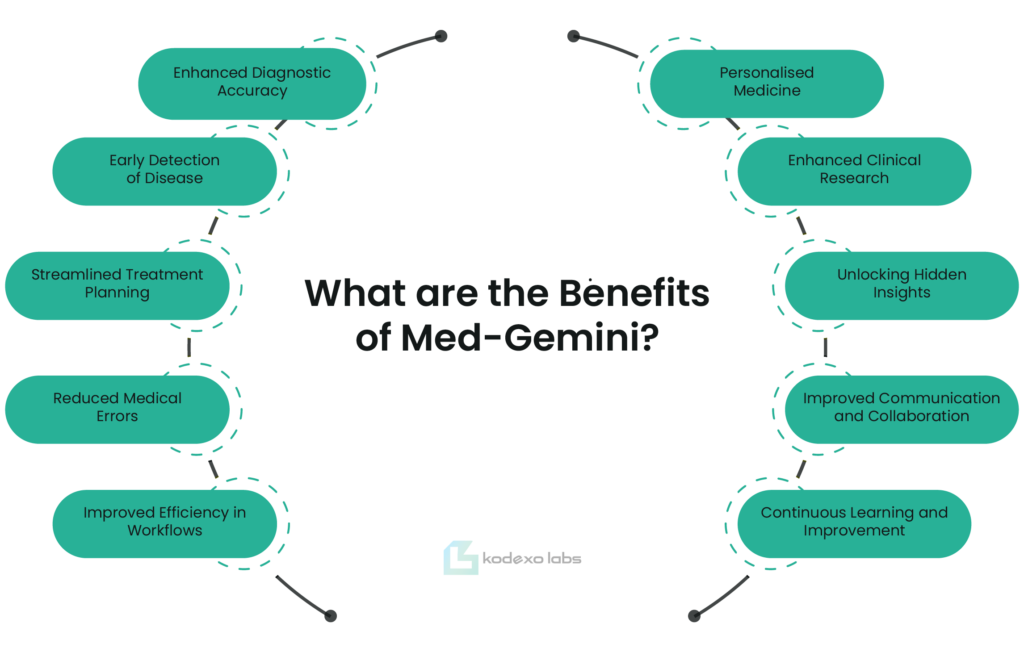
1- Enhanced Diagnostic Accuracy:
Med Gemini analyses vast amounts of patient data through data engineering services, including medical history, imaging results, and lab tests. This comprehensive analysis empowers clinicians with a deeper understanding of a patient’s condition, leading to more accurate diagnoses and personalised treatment plans.
2- Early Detection of Disease:
Med Gemini’s ability to identify subtle patterns in medical data allows for the early detection of various diseases. By highlighting potential risks before symptoms even appear, Med Gemini equips doctors to intervene proactively, potentially saving lives.
3- Streamlined Treatment Planning:
Med Gemini analyses the success rates of various treatment options based on historical data and current medical literature. This allows clinicians to tailor treatment plans to each patient’s specific needs and medical history, leading to improved treatment outcomes.
4- Reduced Medical Errors:
Med Gemini acts as a vigilant assistant, constantly monitoring patient data and alerting healthcare providers to potential medication interactions or missed diagnoses. This reduces the risk of human error and ensures patient safety.
5- Improved Efficiency in Workflows:
Med Gemini automates many time-consuming tasks, such as data analysis and report generation. This frees up valuable time for doctors, allowing them to focus on what matters most: providing high-quality care to their patients.
6- Personalised Medicine:
Med-Gemini personalised medicine by analysing a patient’s unique genetic makeup and medical history. This allows for the development of targeted therapies with fewer side effects and more effective outcomes.
7- Enhanced Clinical Research:
Med Gemini facilitates clinical research by identifying potential participants for clinical trials based on specific criteria. This can significantly accelerate the discovery and development of new treatments.
8- Unlocking Hidden Insights:
Med-Gemini’s ability to analyse vast datasets uncovers hidden patterns and connections in medical data. This can lead to groundbreaking discoveries in various medical fields.
9- Improved Communication and Collaboration:
Med Gemini facilitates communication and collaboration between healthcare professionals by providing a centralised platform for accessing and analysing patient data. This can lead to a more coordinated approach to patient care.
10- Continuous Learning and Improvement:
Through regular “Gemini updates,” Med-Gemini continuously learns and improves its capabilities. This ensures healthcare providers have access to the most advanced AI technology for patient care.
Med Gemini is revolutionising healthcare by empowering clinicians with the power of deep learning. As Med-Gemini continues to evolve, the future of patient care looks brighter than ever.
What are the Uses of Medical Data Systems?
Medical data systems are the backbone of modern healthcare, playing a crucial role in various aspects. These systems collect, store, and analyse a vast amount of patient information, including medical history, diagnoses, treatment plans, and medication use. By harnessing this data, medical data systems offer a multitude of benefits for patients, healthcare providers, and public health initiatives.
One of the primary uses of medical data systems is to improve patient care by data analytics. By providing healthcare providers with a comprehensive view of a patient’s medical history, these systems can aid in accurate diagnoses, personalised treatment plans, and better monitoring of chronic conditions. Additionally, medical data systems can be used to identify potential drug interactions and ensure medication safety. This centralised access to information allows for a more coordinated and efficient approach to patient care.
Beyond individual patients, medical data systems also empower healthcare organisations and public health agencies. By analysing large datasets of patient information, these systems can identify trends in disease outbreaks, track the effectiveness of different treatments, and allocate resources more efficiently. This population-level analysis helps in formulating better public health policies and preventive measures. Furthermore, medical data systems can be used for research purposes, leading to new discoveries and advancements in medical science.
How Can Med-Gemini Aid Business Owners?
Med Gemini, likely an AI-powered tool or service, offers a range of functionalities designed to assist business owners in various aspects of their operations. Here’s a breakdown of six key areas where Med-Gemini can provide significant aid:

1. Enhanced Decision-Making:
Med-Gemini might leverage data analysis to uncover patterns and trends within a business. This can equip owners with valuable insights to inform strategic decisions. Imagine receiving data-driven recommendations on inventory management, marketing campaigns, or staffing needs. Med Gemini could analyse sales figures, customer demographics, and competitor activity to paint a clearer picture and guide better choices.
2. Streamlined Operations:
Repetitive tasks can consume a business owner’s valuable time. Med-Gemini could potentially automate these processes, freeing up the owner’s focus for more strategic endeavours. This might involve automating tasks like scheduling appointments, sending invoices, or generating reports. With these mundane tasks handled efficiently, owners can dedicate their energy to driving growth and innovation.
3. Improved Customer Experience:
Med-Gemini could be designed to enhance customer interactions. It might facilitate features like chatbots for 24/7 customer support or personalised product recommendations. Imagine a customer receiving instant answers to their queries through a chatbot or receiving targeted promotions based on their purchase history. This can lead to happier customers, increased sales, and improved brand loyalty.
4. Cost Optimization:
Med Gemini could potentially identify areas for cost-saving within a business. This might involve analysing spending patterns or suggesting alternative suppliers for raw materials. By pinpointing areas of overspending, Med Gemini can empower owners to make informed financial decisions and optimise their budgets.
5. Risk Management:
Med-Gemini might be equipped to analyse potential risks and suggest mitigation strategies. This could encompass tasks like monitoring competitor activity or identifying potential security threats. By proactively addressing risks, Med Gemini can help business owners safeguard their operations and ensure long-term sustainability.
6. Competitive Advantage:
In today’s competitive business landscape, a slight edge can make a significant difference. Med-Gemini’s functionalities, such as data analysis and automation, can equip owners with the tools they need to stay ahead of the curve. By leveraging insights and streamlining processes, Med-Gemini can empower business owners to make smarter decisions and achieve a competitive advantage.
What Industries May be Impacted by Med-Gemini?
The emergence of Med-Gemini, a powerful AI model designed for the healthcare sector, promises to send shockwaves through numerous industries. Its capabilities in medical knowledge, diagnosis, and treatment planning have the potential to revolutionise how we deliver and experience healthcare. Let’s delve into some of the industries that will likely be significantly impacted by Med Gemini’s influence.
First and foremost, the healthcare industry itself stands to undergo a major transformation. Med Gemini could assist doctors in various ways, from analysing medical images and identifying potential diseases to suggesting treatment plans and predicting patient outcomes. This could lead to faster diagnoses, more personalised care, and potentially, improved patient results. Additionally, Med-Gemini’s ability to handle vast amounts of medical data could streamline administrative tasks and free up healthcare professionals to focus on more complex patient interactions.
The impact of Med Gemini will likely extend beyond hospitals and clinics. The pharmaceutical industry could leverage Med Gemini’s capabilities in genomics and clinical reasoning to accelerate drug discovery and development. This could lead to the creation of more targeted and effective medications. Insurance companies might also utilise Med-Gemini’s analytical prowess to assess patient risk profiles and personalise healthcare plans.
Furthermore, Med Gemini has the potential to disrupt the telemedicine industry. By offering remote diagnosis and treatment recommendations, Med Gemini could expand access to healthcare in underserved areas and for patients with limited mobility. This could significantly improve healthcare equity and accessibility.
In conclusion, the arrival of Med Gemini marks a turning point for the healthcare landscape. Its influence will likely ripple outwards, impacting not only the medical field itself but also related industries like pharmaceuticals, insurance, and telemedicine. As Med Gemini continues to evolve, its applications will undoubtedly continue to expand, shaping the future of healthcare delivery and patient experience.
How to implement AI for Medical Reasoning?
Artificial intelligence (AI) has the potential to revolutionise the field of medicine by assisting with complex medical reasoning. Here are seven ways AI development can be implemented to improve medical diagnosis, treatment planning, and overall patient care:

1- Enhanced Diagnostic Tools:
AI algorithms can analyse vast amounts of medical data, including patient history, imaging scans, and lab results. This allows for identification of patterns and potential diagnoses that might be missed by human doctors. AI can also be used to develop decision-support systems that suggest relevant tests and next steps for a specific patient’s case.
2- Drug Discovery and Development:
AI can accelerate the process of drug discovery by analysing molecular structures and predicting how they might interact with diseases. This can lead to the development of more targeted and effective treatments. AI can also be used to optimise clinical trials by identifying the most promising candidates and designing more efficient trial protocols.
3- Personalised Medicine:
AI can analyse a patient’s individual genetic makeup and other factors to predict their risk of developing certain diseases. This allows for preventive measures and personalised treatment plans tailored to the specific needs of each patient.
4- Robotic-Assisted Surgery:
Robotic surgery systems guided by AI can improve precision and minimise complications during minimally invasive procedures. AI can also be used to analyse surgical data in real-time, providing surgeons with valuable insights during the operation.
5- Epidemic Prediction and Prevention:
AI can analyse disease outbreaks and travel patterns to predict the spread of infectious diseases. This allows for early intervention and implementation of preventative measures to control outbreaks.
6- Virtual Assistants and Chatbots:
AI-powered virtual assistants and chatbots can provide patients with 24/7 access to information and support. They can answer basic medical questions, schedule appointments, and even offer emotional support.
7- Administrative Tasks and Streamlining Workflows:
AI can automate many administrative tasks in healthcare, such as scheduling appointments, managing patient records, and processing insurance claims. This frees up valuable time for medical professionals to focus on patient care.
It’s important to remember that AI is a tool meant to assist medical professionals, not replace them. The human element of medicine, including empathy, critical thinking, and patient interaction, will always be irreplaceable.
Can AI in Medical Data Systems have a Huge Impact on Jobs?
The rise of AI in healthcare, particularly within medical data systems, presents a fascinating scenario. On one hand, AI has the potential to automate many tasks currently performed by healthcare professionals. This includes analysing vast amounts of medical records, identifying patterns and trends, and even generating initial diagnoses. This automation could lead to job losses in certain areas, particularly for roles heavily reliant on data processing and analysis.
However, the impact of AI on healthcare jobs is likely to be more nuanced than simple replacement. AI is much better at handling repetitive tasks, freeing up valuable time for medical professionals. Doctors, nurses, and other healthcare workers can then focus on what AI struggles with: empathy, critical thinking, and the complex human aspects of patient care. This shift in focus could lead to the creation of new types of jobs, requiring skills in collaboration with AI and interpretation of its findings.
Furthermore, AI analysis of medical data can unlock new possibilities for personalised medicine and preventative healthcare. This could create entirely new job markets focused on developing and implementing these advancements.
Overall, the impact of AI in medical data systems on jobs is likely to be a mixed bag. While some roles may be affected, AI is more likely to transform how healthcare professionals work rather than eliminate their jobs entirely. The key will be for healthcare professionals to develop new skill sets that complement AI’s capabilities, ensuring a future where humans and machines work together to deliver better patient care.
Seamless Collaboration | Cost-Efficient Solutions | Faster Time-to-Market

What is the Role of Deep Learning (DL) in Med-Gemini?
Med-Gemini, a recent innovation from Google, stands out in the field of healthcare AI models. This cutting-edge system leverages the power of deep learning (DL) to achieve remarkable results in complex medical tasks. But what exactly is deep learning, and how does it contribute to Med-Gemini’s capabilities?
Deep learning is a subfield of machine learning inspired by the structure and function of the human brain. It utilises artificial neural networks, mimicking the interconnected neurons that process information. These networks are trained on vast amounts of data, allowing them to identify patterns and relationships. In the context of Med Gemini, this data can include medical records, research papers, imaging scans, and even patient-generated information.
Through deep learning, Med Gemini can perform several crucial tasks. One key area is medical image analysis. By processing medical scans like X-rays and MRIs, Med Gemini can detect anomalies and assist healthcare professionals in diagnosing diseases. Additionally, deep learning empowers Med Gemini with advanced capabilities in clinical reasoning. By analysing vast amounts of medical data, the system can learn to identify risk factors, predict potential outcomes, and suggest treatment options. This can significantly aid doctors in making informed decisions for their patients.
In essence, deep learning serves as the foundation for Med Gemini’s impressive performance. It equips the system with the ability to learn from data, identify patterns, and make data-driven predictions in the healthcare domain. This paves the way for a future where AI can play a vital role in supporting medical professionals and improving patient care.

Author Bio
Syed Ali Hasan Shah, a content writer at Kodexo Labs with knowledge of data science, cloud computing, AI, machine learning, and cyber security. In an effort to increase awareness of AI’s potential, his engrossing and educational content clarifies technical challenges for a variety of audiences, especially business owners.
